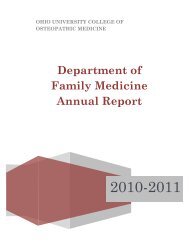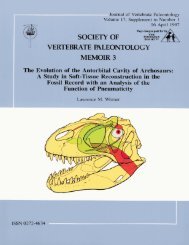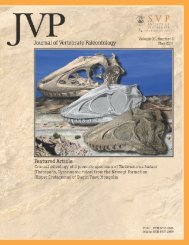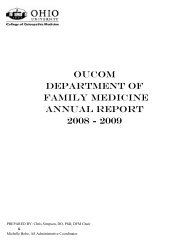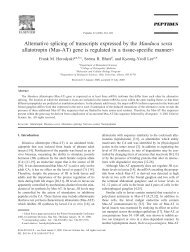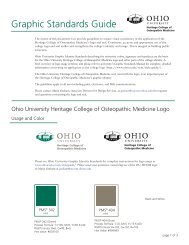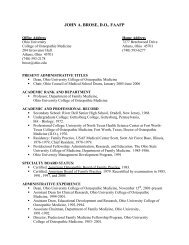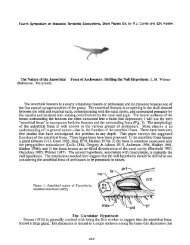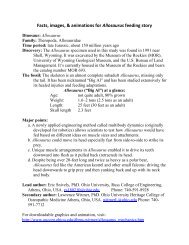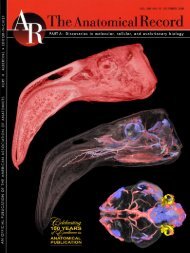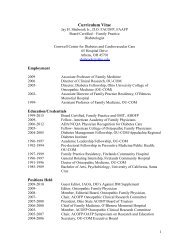DO - Ohio University College of Osteopathic Medicine
DO - Ohio University College of Osteopathic Medicine
DO - Ohio University College of Osteopathic Medicine
Create successful ePaper yourself
Turn your PDF publications into a flip-book with our unique Google optimized e-Paper software.
theme through the COE’s newly developed certificate<br />
program in intercultural communication at OU-COM.<br />
As warm and welcoming as this sounds, Orbe’s program is<br />
no feel-good affirmation fest. In fact, it can be downright<br />
uncomfortable. Participants must critically examine their<br />
own cultural identities, assumptions and biases; learn to<br />
implement communication principles and practice negotiating<br />
patients’ culturally based beliefs about medical care through<br />
simulated interviews.<br />
“This is not cultural sensitivity training. This is about developing<br />
strong communication skills so you get the most meaningful,<br />
productive exchange out <strong>of</strong> a 15-20 minute meeting with a<br />
patient,” Orbe says.<br />
Developing this dynamic series was a team effort. Burnett,<br />
Ann Brieck, associate director <strong>of</strong> student affairs, and Harold<br />
C. Thompson III, D.O., director <strong>of</strong> multicultural affairs, worked<br />
with Orbe to develop the OU-COM certificate program in<br />
intercultural communications, funded by a federal Health and<br />
Human Services Center <strong>of</strong> Excellence grant.<br />
“Cultural training is growing because <strong>of</strong> the demand <strong>of</strong> students,”<br />
Thompson says. “Our world is changing, and students<br />
understand the need to grasp it. We want to provide them<br />
with more practice inside and outside <strong>of</strong> the classroom.”<br />
Mindful approach<br />
As a biracial, first-generation college student, Orbe was drawn<br />
to the cultural aspects <strong>of</strong> communication. After earning his<br />
bachelor’s degree at <strong>Ohio</strong> <strong>University</strong>, he returned for a doctorate,<br />
also in communication studies, during which time his wife gave<br />
birth to their first child at O’Bleness Hospital. He now teaches<br />
intercultural communication at Western Michigan <strong>University</strong>.<br />
“There’s an inextricable relationship between culture and<br />
communication,” he says. “I explore ways in which that<br />
relationship manifests.”<br />
Orbe led his first OU-COM seminar, called “Physician-Patient<br />
Communication in a Multicultural Society,” during winter<br />
quarter 2006. Participants met twice, for a total <strong>of</strong> nine<br />
hours. They earned two academic credits and were given an<br />
overview <strong>of</strong> basic communication concepts and theories<br />
and how they relate to practical medical settings.<br />
“In terms <strong>of</strong> health-care communication, what you say and<br />
how you say it leads to different interpretations among<br />
different people,” says Becky Teagarden, a second-year<br />
medical student who attended this first seminar.<br />
In addition to differing disease propensities across cultural<br />
groups, there are differences in healing methods. Many<br />
groups trust traditional remedies—such as indigenous herbs<br />
and healing rituals—to Western medicine. Cultures can also<br />
express differences in their radius <strong>of</strong> personal space or level<br />
<strong>of</strong> family involvement in decision-making.<br />
Such cultural tips can be helpful, but it’s impossible to<br />
memorize the genetic predispositions, medical practices and<br />
social etiquette <strong>of</strong> every culture. The trick, according to<br />
Orbe, is to ask probing questions and cultivate mindfulness.<br />
michaeldibari.com<br />
From left, first-year students Nicholas Niemiec, Michael Finamore, Aaron Wolk<strong>of</strong>f, Ismail Oshogwemoh, Brett Buller, Jason<br />
Lane, and Baldassare Pipitone toss a ball <strong>of</strong> yarn to create a network <strong>of</strong> gratitude, admiration, appreciation and humanity as<br />
the seminar draws to a close.<br />
16 www.oucom.ohio.edu



